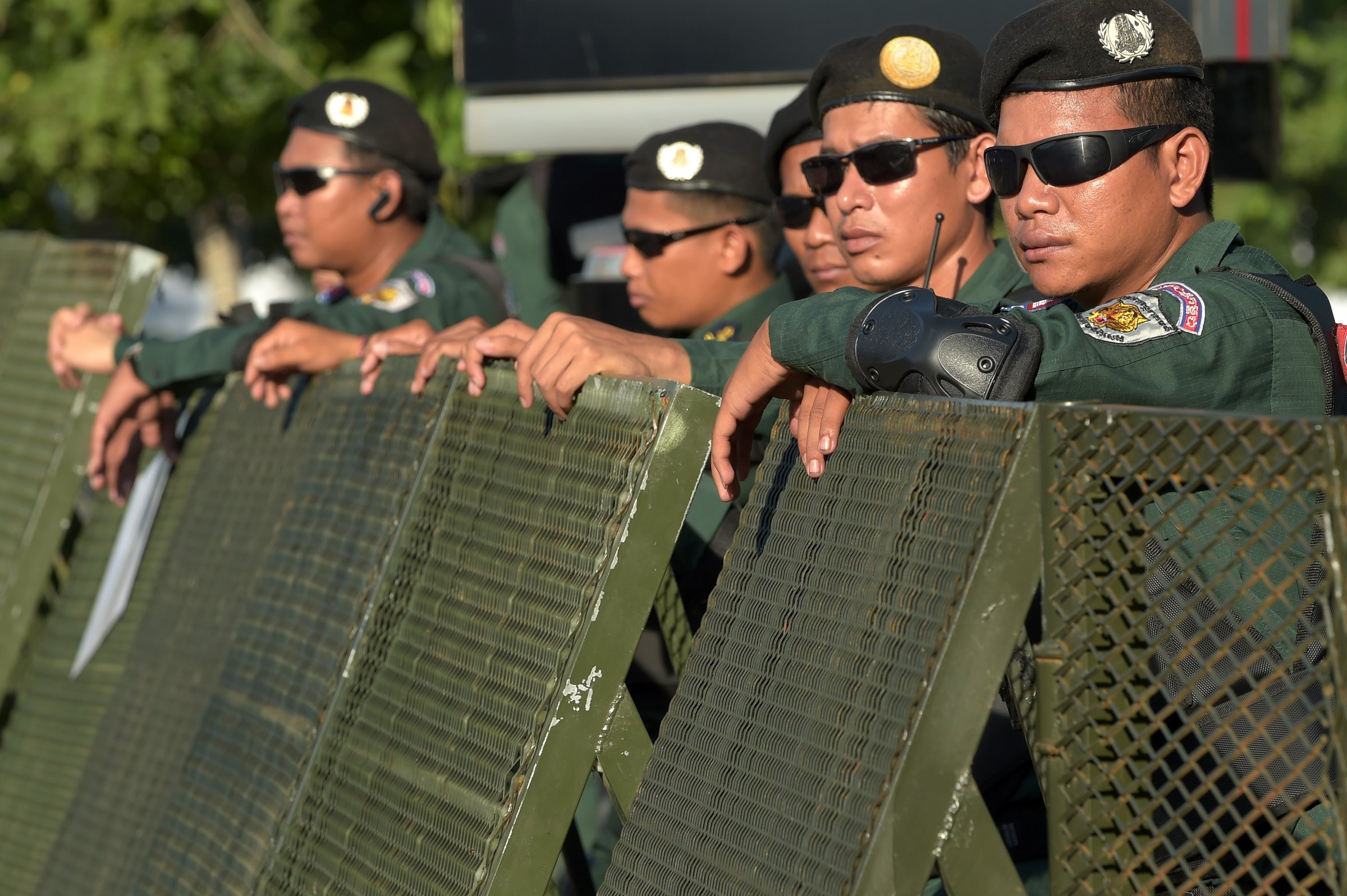
Cambodia’s Supreme Court ruled Thursday to dissolve the country’s only credible opposition party, paving the way for an all-but-certain ruling party coronation following 2018 general elections and dealing what experts call a final blow to the nation’s already damaged democracy.
As was widely expected, the judges favored Prime Minister Hun Sen’s request that his only viable political rival be quashed, effectively rendering Cambodia a one-party state. The ruling Cambodian People’s Party’s (CPP) claims the opposition Cambodian National Rescue Party (CNRP) is conspiring with the U.S. to win the upcoming election, and has labeled campaign activities acts of treason.
The ruling not only disbands the CNRP, but it also bars 118 members of the opposition party from politics for five years, and strips the CNPR of all its elected seats, including commune chiefs and national legislators.
“By forcing the dissolution of the CNRP, PM Hun Sen has sounded the death knell for both democracy and human rights in Cambodia,” says Phil Robertson, deputy Asia director of Human Rights Watch. “He’s afraid that he might lose the July 2018 national election. [But] without the CNRP in the running, next year’s election will be a total joke – and those donors who are supporting it, like Japan and the EU, will be seen as complicit in this farce.”
In a strongly-worded statement, Global Witness said the ruling marks Cambodia’s descent into “outright dictatorship,” a serious blow for the nation, and for the many countries that have supported the post-Khmer Rogue democratization efforts.
“The dissolution of Cambodia’s opposition party marks a tragedy not only for Cambodia, but for all of those countries that have worked for decades to help rebuild the country from the devastation of the Khmer Rouge genocide. Billions of aid dollars have been spent on supporting Cambodians to develop a democratic system that respects the rule of law and basic human rights. Today’s news suggests that that project has failed,” said Emma Burnett of Global Witness.
On the day of the verdict, much of the capital Phnom Penh was on lockdown, with police barricades rolled out and security forces deployed in anticipation of a public uprising that never materialized.
Cambodia’s politics have long been riddled with periodic outbursts of repressive violence and spurious criminal charges. But human rights groups and political analysts say today’s verdict, as well as the escalating crackdown on the opposition party leading up to it, mark the most serious assault on Cambodian democracy in decades, eviscerating all pretense of a fair, multiparty system.
Since the leader of the opposition, Kem Sokha, was arrested on Sept. 3, more than half of the sitting CNRP lawmakers have fled the country, fearing arrest or violence. US-linked groups like Voice of America, Radio Free Asia and the National Democratic Institute have also been forced to disband or leave the country. The Cambodia Daily, one of the country’s leading English-language papers, was also shuttered on dubious pretenses.
Read more: ‘Going Down In a Blaze of Glory.’ The Brief, Crusading Life of the Cambodia Daily
But the verdict to dissolve the CNRP also betrays Hun Sen’s deep-seated anxiety about his own party’s chances in the next general election. He does not appear willing to roll the dice after the opposition made large gains in local elections this past June.
Hun Sen, a former Khmer Rouge commander, has held onto power since 1985, making him the world’s longest-ruling Prime Minister. While his tenure as the country’s strongman leader has led to tremendous growth in the wake of the devastating famine and economic decline under the regime he once served, inequality is also on the rise.
Younger generations, who make up the bulwark of the young nation’s population, have come of voting age and are agitating for change. In 2013, when the CNRP alleged that widespread corruption robbed them of an election victory, youthful protesters poured into the streets, facing down tear gas and water canisters in a display of newfound political engagement. But Noan Sereiboth, a Cambodian political blogger, warns that the country’s “democracy has grown dark.”
More Must-Reads from TIME
- Why Biden Dropped Out
- Ukraine’s Plan to Survive Trump
- The Rise of a New Kind of Parenting Guru
- The Chaos and Commotion of the RNC in Photos
- Why We All Have a Stake in Twisters’ Success
- 8 Eating Habits That Actually Improve Your Sleep
- Welcome to the Noah Lyles Olympics
- Get Our Paris Olympics Newsletter in Your Inbox
Write to Laignee Barron at Laignee.Barron@time.com